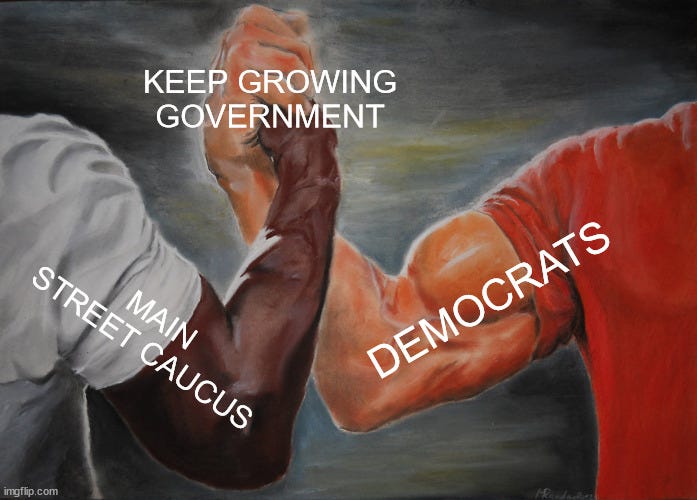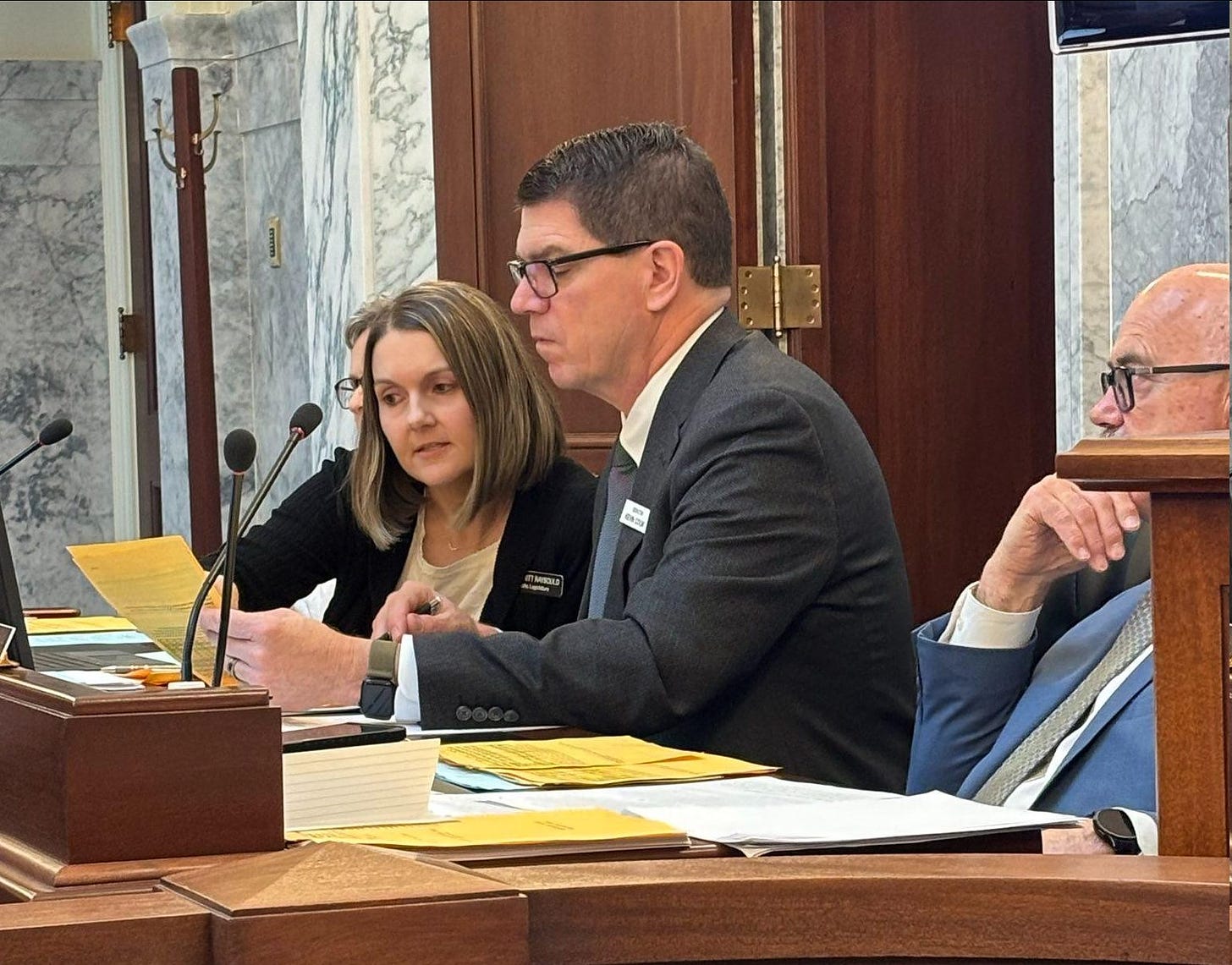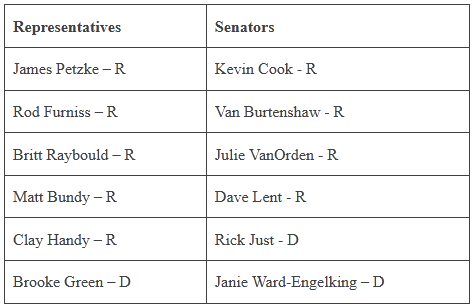As far as the Idaho Constitution is concerned, the Legislature has one job: fund the government. They can ignore every other bill that is introduced, but they cannot adjourn the session until they have passed a balanced budget.
The Joint Finance-Appropriations Committee (JFAC) is composed of ten senators and ten representatives who create the budgets that the Legislature must pass. Sen. C. Scott Grow, the current co-chair of JFAC, has said that when he was first appointed to the joint committee he wondered why he was there. As far as he could tell, JFAC simply rubber stamped the budget requests it received from the governor.
Sen. Grow wanted to do things differently this year, reclaim the Legislature’s authority as a coequal branch of government. He worked with fellow co-chair Rep. Wendy Horman to split agency budgets into two parts. The first is the maintenance budget, the appropriations required to keep the lights on and the doors open. The second is the line item increases, the wish list from the governor and the hundreds of agencies that make up our government.
This is a fantastic idea. The problems with the old way of doing things are twofold:
First, JFAC tended to present all the budgets at once near the end of the session, when legislators are itching to get home. This effect is even more pronounced in election years when lawmakers want to hit the campaign trail. That put tremendous pressure on legislators to simply vote yes and hit the road rather than seriously debating each one of the more than 100 budget bills they had to consider.
Second, by including maintenance and line item increases in the same budget, fiscal conservatives faced a tough choice. If they voted for the budget, then they were simply rubber stamping the governor’s requests, but if they voted against because they disagreed with spending increases, then their opponents accused them of trying to defund the police or other essential services.
Splitting the budgets solved both problems at once. JFAC finished the maintenance budgets only a few weeks into the session and sent them to the House and Senate floors. This meant that the Legislature would be able to fulfill their duty to fund the government while leaving plenty of time to debate requests for increases. Fiscal conservatives could also cheerfully vote for the maintenance budgets while rejecting the increases.
It sounds great, doesn’t it? Who could disagree with the new process? It turns out there are quite a few naysayers.
Despite every Republican on JFAC voting in favor of the maintenance budgets last month, on Friday morning nine Republicans joined with the three Democrats to pass new budgets that include both the maintenance portion and the spending increases. Not only did they spring this coup on Sen. Grow at the last minute, they did so on a day when Rep. Horman was out sick.
This is an example of what happened Friday morning. Sen. Scott Herndon introduced a budget for the Board of Tax Appeals that included only the new spending increases. However, Rep. Rod Furniss and Sen. Kevin Cook made a substitute motion to introduce the full Board of Tax Appeals budget, including both the maintenance portion which already passed as well as the new increases:
The tally you see on the right remained the same for every vote. Nine Republicans and three Democrats joined forces to undo all the hard work of Sen. Grow and Rep. Horman.
In the aftermath of the coup, Rep. Josh Tanner spoke to Matt Edwards on Idaho Signal about what had just happened. He summed it up perfectly with one quote: “There’s a lot of people out there that don’t want transparency within government… it makes them extremely nervous.”
Niklas Kleinworth of Idaho Freedom Foundation explained the situation well Friday evening:
The showdown now moves to the House and Senate floors, each of which have duplicate budgets under consideration. House Speaker Mike Moyle appears to support the new process, while Senate President Pro Tempore Chuck Winder has not shared his plans with me. However, Ron Nate, president of the Idaho Freedom Foundation, points to Winder as the ringleader of this budget circus:
We reached out to Winder to find out his plans for dealing with his rogue senators on the JFAC committee. He did not return calls, and otherwise he has been silent on the whole budget circus matter. Apparently he approves of how things went down; or worse, has been directing the circus to begin with.
This makes sense because for the last two weeks, Winder has been trying to undo the process of base budgets set in place by co-chairs Grow and Horman. He explored ideas for invoking a little-known legislative rule (Joint Rule 11) to wrestle back control of the committee, there were discussions for JFAC rescinding the base budget motions, and possibilities for the Senate to hold or return the budget bills. All of Winder’s efforts were met with roadblocks until yesterday’s circus unfolded in committee. Winder’s fingerprints are all over this spending coup.
Is this true? Does the buck stop with the pro tem? Or does it go higher? (Edit: "Higher" might be the wrong word. The branches of government are coequal, not hierarchical.)
On the same day as the JFAC coup, the Idaho Capital Sun published an article about the new budget process. Author Clark Corbin quoted Gov. Brad Little as being skeptical of the new process:
“It is the most replicated system in the nation,” Little told the Sun. “When they started the joint process it wasn’t too long before I interned there in 1976, and ever since then it’s been very, very replicated. So if you are going to make a change, what are the intended and the unintended consequences? (There is also) the issue of who gets to define ‘maintenance?’”
One unintended consequence Little sees is it could be more difficult to pass the line items and new budget requests because the maintenance budgets are separated out and the line items are isolated.
However, Sen. Janie Ward-Engelking, one of three Democrats on JFAC, might have let the cat out of the bag. On Idaho Public Television’s Idaho Reports program, Ward-Engelking pointed out that funding for the Launch Grant was not included in the maintenance budgets. That meant that Launch, Gov. Little’s signature program, would be in danger of being defunded if the Legislature did not pass its budget before adjournment.
Little used every ounce of political capital to push Launch through last year. The program awards $8,000 to high school graduates to spend for job training at certain “in-demand” careers, which are selected by a committee of legislators and business leaders. I think my initial characterization of Launch as a payoff of tax dollars to private businesses using students as the bagmen remains correct.
The governor is very proud of the program, however. Most of his posts on social media are about how many students have benefited from the grant, and he devoted time in his State of the State Address to share stories of graduating seniors who qualified for the program.
All of this raises some pertinent questions:
Would Governor Little work behind the scenes to kill the new budget process if he thought Launch was in danger?
How long have the Main Street Republicans been planning the coup they unleashed Friday? Did they meet secretly prior to Friday’s committee hearing?
Was Sen. Winder involved with the coup? It’s likely that he had a hand in keeping the maintenance budgets from reaching the Senate floor for more than two weeks. Was he holding them long enough to allow for the coup to take shape?
What role have the other members of House and Senate leadership played? Where are Rep. Megan Blanksma and Sen. Kelly Anthon on this issue?
This is about as clear cut a battle of good and evil as you can find in the legislative process. Sen. Grow and Rep. Horman came up with an idea to increase transparency, rein in spending, and slow the growth of government, and a cadre of lawmakers worked behind the scenes to undermine this idea.
At least it’s clear to those of us who are plugged into the session. Regular voters often don’t see the minute details or grasp the significance of what has happened, yet it’s imperative to understand who is working against us at the Capitol. Every Republican, even the moderates, claim a desire to stop growing government and rein in spending, yet here is a whole crew working in secret to resume unfettered growth and spending increases.
For those of you who are engaged, make sure to use Email Idaho to share your thoughts with your legislators, JFAC, and House and Senate leadership. Tell them that we want to see more transparency and fiscal conservatism, and that we are paying attention to what they do in the next few days.
Here are the names of the JFAC members who participated in Friday’s coup:
(Rep. Green was absent, but her substitute dutifully voted with the plotters.)
Idaho voters should not forget these names, nor what they did on Groundhog Day 2024.
Bonus note for paid subscribers below:
Keep reading with a 7-day free trial
Subscribe to Gem State Chronicle to keep reading this post and get 7 days of free access to the full post archives.







